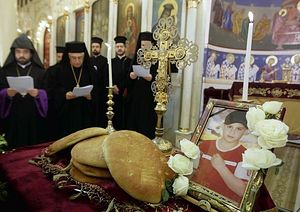Damascus, Syria, March 6, 2012

|
| Greek Orthodox priests in Damascus pray during a Mass in January for a Christian boy who was killed in the fighting in the central Syrian city of Homs. (Joseph Eid / AFP/Getty Images / January 9, 2012) |
But as a priest offered up a prayer for peace one recent Sunday, the 70-year-old widow dabbed tears from her eyes.
"I was wishing that life would go back to the way it used to be," she said.
At night, Um Michael can hear the echoes of fighting near her home in Bab Touma, the centuries-old Christian quarter of Damascus. Like many Christians here, she wonders whether Syria's increasingly bloody, nearly yearlong uprising could shatter the veneer of security provided by President Bashar Assad's autocratic but secular government.
Assad has portrayed himself as the defender of the nation's religious minorities, including Christians and his Alawite Muslim sect, against foreign-backed Islamic extremists. Opposition activists scoff at that notion, saying he has deliberately exploited sectarian fear to stay in power.
But warnings of a bloodbath if Assad leaves office resonate with Christians, who have seen their brethren driven away by sectarian violence since the overthrow of longtime strongmen in Iraq and in Egypt, and before that by a 15-year civil war in neighboring Lebanon.
Many here fear revenge attacks against minorities, who helped buttress four decades of repressive rule by the Assad family, and the emergence of what they describe as a new dictatorship by the Sunni Muslim majority.
"If the regime goes, you can forget about Christians in Syria," said George, a 37-year-old dentist who, like others interviewed, asked to be identified by either a first name or nickname. "Look what happened to the Christians of Iraq. They had to flee everywhere, while most of the churches were attacked and bombed."
Although not all of Syria's Christians back Assad, their fear helps explain the significant support he still draws despite the ferocious crackdown on what began as mostly peaceful protests and his government's increasing international isolation.
Worried Christians have only to look to the strife-torn city of Homs to see what a civil war might look like. There, residents say, Sunnis, Christians and the Alawite community, a small offshoot of Shiite Islam, have fallen victim to gruesome kidnappings and killings.
The rise of Islamist parties in post-revolutionary Egypt and Tunisia has added to the feeling among Syria's Christians that they are under siege. Some find affirmation of their fear in the demonstrations that take place every week after Muslims' Friday payers, when antigovernment protesters spill out of mosques nationwide, chanting religious and political slogans.
"Of course the 'Arab Spring' is an Islamist movement," George said angrily. "It's full of extremists. They want to destroy our country, and they call it a 'revolution.'"
Syria's Christians, who represent no more than 10% of the country's 22 million people, trace their origins two millenniums to the beginnings of the faith. The apostle Paul is said to have converted to Christianity on the road to Damascus, from which he went on to spread the religion across the Roman Empire.
Church leaders have largely aligned themselves behind the government, urging their followers to give Assad a chance to enact long-promised political reforms while also calling for an end to the violence, which has killed more than 7,500 people on both sides, according to United Nations estimates.
Ignatius IV, patriarch of the Greek Orthodox Church, described Syria as an oasis of religious tolerance where Christians can worship freely, build sanctuaries and run schools, activities that are restricted by varying degrees in a number of Middle Eastern countries.
Christian clerics are frequently shown on television taking part in joint prayer services with their Muslim counterparts. The defense minister is a Christian, as are other senior members of the government and security forces.
"Wherever you go, you find Christians and Muslims," said the patriarch, who has a photograph of himself with Assad displayed on his office wall. "There is no distinction."
Although there are dissenting voices, few dare to speak publicly, said a priest who did not want his name published for fear of retribution. In January, a fellow cleric was shot and killed while trying to help an injured parishioner in the city of Hama, a center of the uprising. Each side blamed the other for his death.
"In my opinion, [Assad] did not protect minorities, he protected himself," said the priest. "It's a regime of family, friends and corruption. And corruption does not have a religion."
Copyright © 2012, Los Angeles Times
